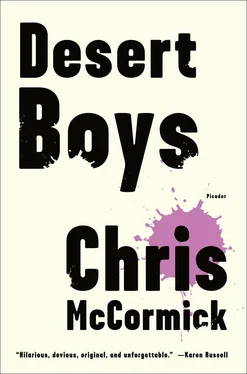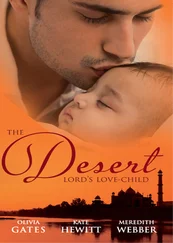I asked if I could use the bathroom before heading out. He pointed me past the poker game into the back of the store. In the bathroom, I looked into the mirror and found that the swelling in my lip had gone down to about normal. The healthy pink color had returned. On my way out, my dad shouted a friendly, “See ya, son!” As I unlocked my bike, I checked my reflection again in the chrome. The plum color had moved to my forehead. I realized the color was on the bike, an old splatter from a paintball.
19. My sister, visiting from college, told me my acne — spreading from my forehead to my throat, purple cysts studding my back, chest, and shoulders — wasn’t “normal.” Jean said, “Everyone gets pimples, but your pimples are getting you. ”
20. I’d seen queer men on TV, and I made it a point not to let my wrists go limp, not to speak my s ’s like a cartoon snake. But one day, Roxanne Karinger told me I walked “different.” Recently I’d been fantasizing about her brother, and I was afraid she’d caught on.
“Different how?” I asked.
“I don’t know,” Roxanne said. She was two years my junior, but her girlhood made me admire her and even want, at times, to be her. “Like, more of a bounce? Your heels never touch down.”
After that I walked in small, lazy steps. I leaned back and kept my weight on my heels. Took twice as long to get anywhere.
21. My mom took me to a dermatologist and, after listening to his suggestions for medication, said, “He used to have the cleanest skin.” She hadn’t said “smoothest,” she hadn’t said “clearest.” She’d said, as if I’d neglected to bathe, as if my acne were the manifestation of a deep filth within me, “He used to have the cleanest skin.”
22. Every fender in town carried a magnet in the shape of a ribbon to support the troops in Iraq and Afghanistan. Once, in the Best Buy parking lot, forty-three magnetic ribbons adorned the bumpers and front grille of a yellow Hummer. By the time I walked past, the count had been reduced to forty-two.
I’d stolen the stupid magnet as a joke to myself, as a kind of silly protest, but when the Hummer’s owner yelled at me from across the parking lot, I started to run. The owner caught me, tackled me to the curb along a parking-lot island filled with coconut-sized rocks and miniature cacti. I lay on my back, and the man stood, shoving his foot against my chest like a pro wrestler. In size and looks, he bore a striking resemblance to Danny DeVito, but he was strong, giving me just enough air to breathe. He plucked the magnet from me and said, “What the hell is wrong with you?”
I said, “It was a joke.” Blood trickled down my arm — I’d been scratched by one of the cacti — but I was too afraid to feel any physical pain. My qualm with the magnets — why wouldn’t these flag-wavers actually support the troops, by demanding the end of the war? — gave way to a stuttering desperation to escape unscathed. “I’m sorry,” I said, nearly crying. “I didn’t think you’d miss one of your five hundred magnets.”
That’s when he told me he had forty-three: one for every AV kid hurt or killed over there. Before letting me go, he said, “You may have taken my son, you little fuck.”
23. My parents went into debt so I could take a drug called isotretinoin, which dried my skin to flakes. For six months I couldn’t be touched. My mom would blow me a kiss from across the living room, and if I blew a kiss back, the powder of my skin would blossom from my palm like chalk. At school I stayed in classrooms at lunch to avoid the sun, and when I got up to leave at the end of the day, I had to brush off my seat and desk. Everywhere I went, I left pieces of myself.
24. Once my skin cleared up, Jean took me to one of the four new Starbucks in town and bought me a caramel frappé. I asked about life at UCLA, but she kept batting away my questions. “The real question is,” she said, “when are you going to come out already?”
According to Jean, Dad had asked her if she thought I might be gay. “You should ask him, ” she’d said, “but what if he were?” My dad said all he knew was that Mom couldn’t find out. “It would kill her,” he said. “Being from another culture, it would kill her.”
25. In the months before Brokeback Mountain opened — my final months in town — Christian protesters outside the theater carried signs complaining of obscenity. In the parking lot, I counted three pairs of chrome testicles and a set of mud flaps bearing naked cartoon women.
26. Condescension didn’t necessarily make you wrong, but in the Antelope Valley, it seemed to help convince people you were right. For all I knew, Dad was right about Mom. Maybe finding out I was queer would have killed her. Still, his using her as an excuse to avoid talking to me was a kind of cowardice that, because I recognized it as a trait I’d inherited myself, broke my heart.
27. Jean and I had to pay for our SATs and college applications ourselves, so we got jobs every summer. I’d worked as a neighborhood landscaper, an ice cream parlor boy, and a driving range ball-retriever. The summer before moving away to college, my dad set me up to deliver furniture. The store had a yellow Penske truck with its name plastered on the side — MAVEN’S. I lugged mattresses and box springs and entertainment hutches and curio cabinets from the store’s loading zone — a curb painted green in the small lot — to the houses of people who, seeing me struggle so thoroughly, either offered a tip or offered to help. No one did both.
One week in, I quit. I told my dad I’d tweaked a shoulder, but the truth was I’d nearly tipped the truck over and died on Avenue N. I was driving past an open stretch of desert — one of the last this deep into town — and a tumbleweed the size of a bear bounded into my lane. Thinking it was an animal, I jacked the steering wheel, and the whole truck — freshly unpacked and flimsy — wobbled behind me. The right-side wheels lifted off the pavement, hollowing my chest. By the time the wheels landed, I’d taken the truck into a trench along the side of the road.
While I waited for AAA to free the truck, I watched other tumbleweeds scamper across the road like the severed heads of Gorgons. The screaming wind slapped ropes of sand against my face. I thought, This place hates me just as much as I hate it.
28. The faces of missing girls appeared in the newspaper only to show up again six months later, when their bodies had been found in the desert. Violence, the threat of it, was the desert’s language, and like a student in Spanish unable to roll his r ’s, I felt unequipped to join the conversation. But, God, I wanted to. I scanned the inky faces of the raped and murdered girls and was filled with an enormous, unforgivable envy.
29. The day my acceptance letter to Berkeley arrived, Robert Karinger enlisted in the marines. Dad said both were noble endeavors. “He can fight the current threat, and you can help prevent the next one.” But no one could agree on which threats were current, and which were still to come.
30. Just as the war was beginning to lose national support, and as I was packing to move, the local newspaper ran a front-page story under the headline, 31 REASONS WE SHOULD BE IN IRAQ. I remember thinking that if you needed thirty-one reasons to defend a position, you were probably wrong.
The day was warm and tedious, as it usually is when the weather’s gray and dull, when clouds have been hanging overhead for a long time, and you’re waiting for the rain that doesn’t come. My sister and I were already tired of walking, and Brooklyn seemed endless. Across the East River peered the Midtown skyline, chalky and plain under the gray sky. On our side of the river lay an empty stretch of unmown grass that — on sunnier days, according to Jean — served as a place for people to read books or to picnic. At one point, Jean said she could imagine a version of her life in which this day were set on repeat, with me in from California and nature still and pensive. In the past, I’d have made fun of her for a sentence like that, but this was the first time I’d visited since Mom died, so I nodded along in agreement.
Читать дальше












